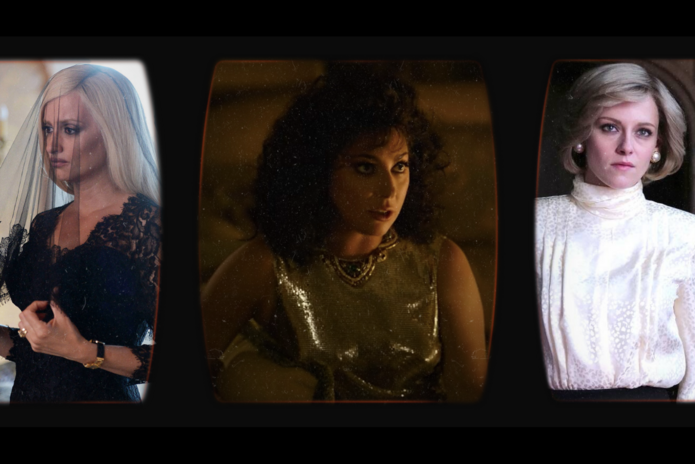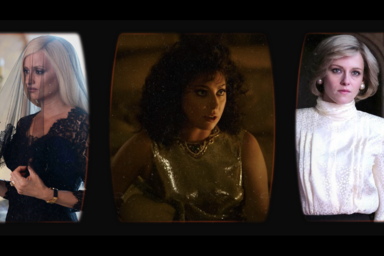House of Gucci, Ridley Scott’s biopic about Patrizia Reggiani’s entry into the iconic Gucci family business and eventual murder of her husband Maurizio Gucci, has created quite a stir in the media. The discourse ranges from beef with Lady Gaga’s questionably Italian accent, to dissections of the camp, “gaslight, gatekeep, girlboss” vibes, and of course the semi-annual revisit to the “Is Adam Driver Hot?” debate. But it’s the Gucci family’s reaction to House of Gucci that’s perhaps been dominating headlines the most.
The Gucci family made a statement to the Associated Press on April 15, months before the film’s release that claimed the film was “stealing the identity of a family to make a profit, to increase the income of the Hollywood system.” After the film came out, the Gucci heirs doubled down, calling it “extremely painful” and “an insult.” They criticized the portrayal of Reggiani, played by Gaga, as a “victim trying to survive in a masculine and chauvinistic corporate culture” when they claim many women held top positions in the company during that time period.
Scott defended his work against their criticism, telling Total Film in a November 26 interview that he “tried to be as respectful as possible by being as factual as possible, and as factual as we can possibly imagine. Time and space sometimes has to jump because of the nature of the length of the film.” He also admitted that “The story, in a funny kind of way, it’s a satire,” suggesting that stretching of the truth was a necessary consequence of good storytelling.
Should good storytelling take precedence over truth? Where is the line?
But should good storytelling take precedence over truth? Where is the line? As the press catfight continues (Al Pacino gets called ugly, Tom Ford laughs, we all grab our popcorn), the vitriol between filmmakers and their subjects begs a question that Hollywood has been grappling with as long as the biopic has been around.
What responsibility, if any, do biopics have toward people that are still alive?
House of Gucci isn’t the only biopic to find itself in hot water for its portrayal. The Assassination of Gianni Versace: American Crime Story, Ryan Murphy’s 2018 Emmy-winning limited series, sparked similar backlash from the surviving members of the Versace family, who put out a statement claiming they did not authorize it, and that it “should be considered as a work of fiction.” Spencer, the Kristen Stewart-led Princess Diana film, also raised eyebrows when those who knew Diana personally said she would be “horrified” by the film’s inaccuracies and depiction of her as a victim. It’s easy to understand the backlash — this is real people’s trauma put on screen, capitalized on for entertainment. But painting all of these interpretations as complete fiction isn’t necessarily true, either — both House of Gucci and Versace were based on books, for which the respective authors spent years researching.
All of these biopics don’t only center on specific families or people, but also on events that had profound effects on pop culture.
The real Patrizia Gucci also complained that Lady Gaga never met with her before filming the movie. But the other side of that coin isn’t necessarily a route to a more honest story. Take Elton John’s 2019 Rocketman, for which he served as executive producer — the film glosses over less pretty parts of John’s life, like his long stint in rehab getting over a coke addiction, according to Mashable. 2018’s Bohemian Rhapsody is another case of letting these real people steer the narrative wheel, to mixed results: Queen members Brian May and Roger Taylor’s involvement as consultants led to speculation that a fair amount of bad behavior had been sanitized, and that Freddie Mercury was portrayed worse than the two of them. They later admitted in 2019 that they “took liberties” in some chronological aspects of the film, but that it was — again — for storytelling purposes. So, were the Gucci family consulted on House of Gucci, the film would probably look quite different — and not much truer, anyway.
It’s worth noting, too, that all of these biopics don’t only center on specific families or people, but also on events that had profound effects on pop culture. When whole populations are affected by the impact of these people’s lives and actions — whether that’s the fashion industry (Gucci, Versace), millions of music fans (Rocketman, Bohemian Rhapsody), or even entire nations (Spencer, Impeachment: American Crime Story) — can one person or family really say that they “own” those stories?
Many of these biopics go beyond simply casting actors to play certain real people. Versace tackles homophobia in America and the impact of the “Don’t Ask, Don’t Tell” policy. Other biopics, like the newly released King Richard, the story of Venus and Serena Williams and their father, goes into depth about racism in the 1990s. These stories are larger than one family and their drama (or their physical appearances). They’re renderings of touchstone cultural moments that brought pain, pleasure, and insight to entire generations, meaning producers have to look at the bigger picture where the real people involved have a much closer, myopic view of the events.
Producers have to look at the bigger picture where the real people involved have a much closer, myopic view of the events.
While filmmakers should exert caution about needlessly sainting or villainizing certain real people, the heart of a good story inspired by true events (a girlboss taking over a fashion empire, for example) is much more likely to stick with audiences than a factual play-by-play that doesn’t construct itself around a central point or message that viewers can take away with them into their own lives and stories.
Maybe the truth is stranger than fiction. Perhaps it’s just more boring. The saying goes that there are two sides to every story, and the “truth” is somewhere in the middle. But in most cases, we make and watch biopics for our truth, not the subjects’.


